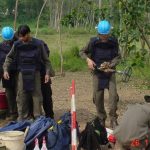PeaceTech is “the movement to use technology to end violent conflict and extremism.”



PeaceTech is “the movement to use technology to end violent conflict and extremism.”

Scholars critique physical infrastructure approaches as ineffective because flooding routinely exceeds defense structures and disaster assistance and removes the incentive for property owners to reduce their risk. As an educational and engagement tool, the flood resilience challenge (FRC) game aims to build the capacity of stakeholders to improve flood resilience and enhance flood risk governance, including collective decision-making.

People around the world are increasingly holding corporations accountable for their practices and seeking ways to rectify their unequal distribution of the risks and benefits among differently positioned populations.

Organizations are gaining awareness that digital products and services targeted at the children’s market segment need to go beyond adopting the “mindset” of a child. Rather, it is necessary to actually invite children to participate in the design process.

The call for responsible innovation is a call to address and account for technology’s short- and long-term impacts within social, political, environmental, and cultural domains. Technological stewardship stands as a commitment to anticipate and mitigate technology’s potential for disruption and especially harm and to guide innovation toward beneficial ends. Dialogue and collaboration across diverse perspectives is essential for developing actionable technological solutions that attend in responsible ways to the evolving needs of society.

All the deep philosophical questions, starts the joke, were asked by the classical Greeks, and everything since then has been footnotes and comments in the margins, finishes the punchline.

This Anniversary Year provides a reason to reflect on the fact that many members have been involved with the IEEE Society on Social Implications of Technology (SSIT) throughout their full professional careers.